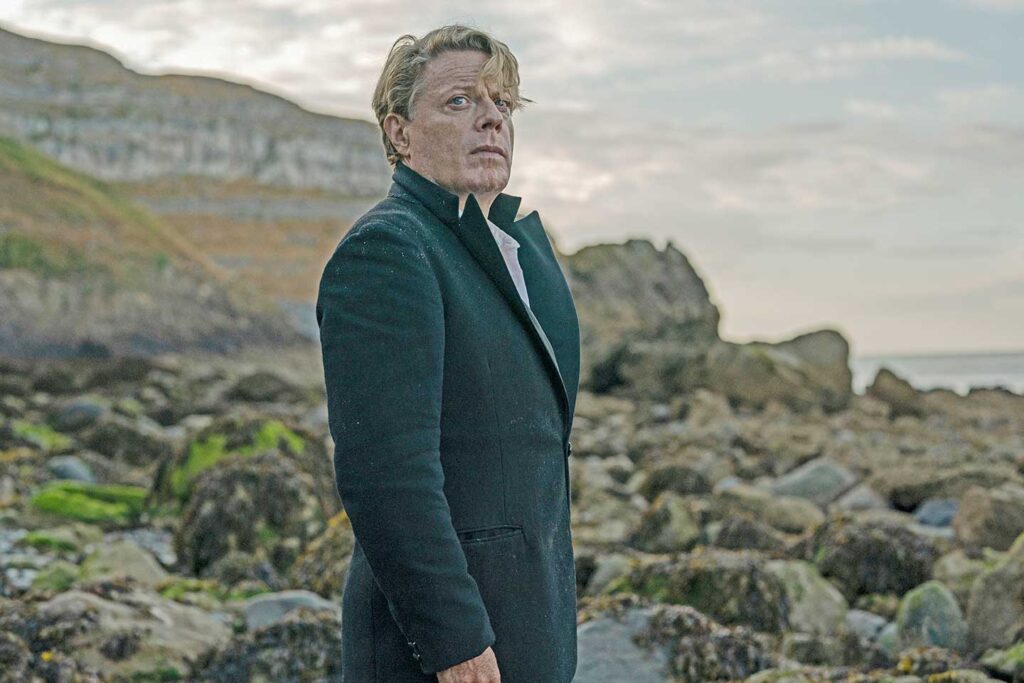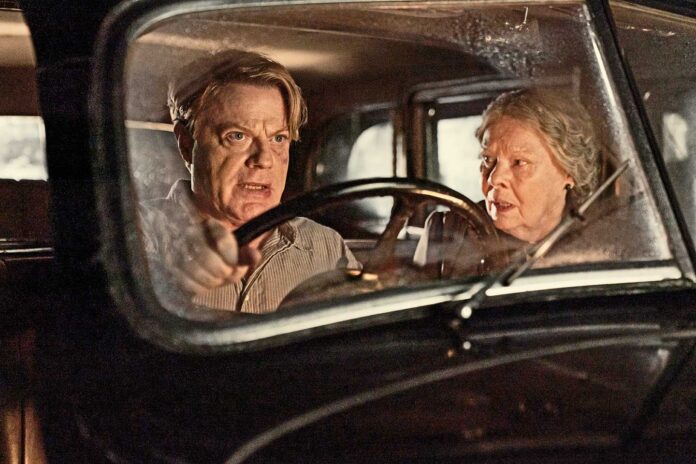Eddie Izzard produced, stars in, and co-wrote the story and screenplay for the absorbing period thriller, “Six Minutes to Midnight.” The film, opening in theaters and available on demand on March 26, is set in the summer of 1939 in Bexhill-on-Sea, where Miss Rocholl (Judi Dench) runs the Augusta Victoria College, a finishing school for daughters and goddaughters of the Nazi high command. Enter Thomas Miller (Izzard), a replacement teacher, who is really a member of the British intelligence hoping to uncover the Germans’ plans. When an intelligence contact is murdered, Thomas is fingered for the crime and must try to save himself, as well as the students.
Izzard acquits herself quite well in the film. She chatted with PGN via Zoom about making “Six Minutes to Midnight.”
How did you learn about the Augusta Victoria College, and what decisions did you make in telling this story?
I’m a patron of the museum of Bexhill-on-Sea. I spent half my life growing up there. The curator showed me the blaze badge from the girls’ school [uniform] — it had a Nazi flag on one side and a British flag on the other. The school was there, the girls were there — Himmler’s goddaughter was there. The German ambassador’s daughter was there, and she was driven to school in an armor-plated Mercedes. The girls listened to Hitler’s speeches and we know they saluted the radio. It’s a lesson from history and the idea of the right wing fighting hearts and minds, and humanity.
This is at least your third film about Nazis, following the drag comedy, “All the Queen’s Men,” and the Tom Cruise vehicle, “Valkyrie.” Why does this historical period appeal to you? And remind me of your term for Hitler?
You mean the Mass-Murdering Fuckhead? Hitler was a criminal and a coward. He avoided fighting at any point and hid behind layers and layers of SS people who protected him. The doctor who tried to save his mom’s life was Jewish, but he used the Jewish people as a scapegoat. I find it fascinating because if we don’t learn from this period, we are doomed to repeat it. As for my film choices — it’s not like I say, “Can I only do war films, please?” You don’t say that to your agent, and it’s not like the producers say, “This Eddie guy, he only does the war films…” They come along.

The film is very much about characters living double lives. In addition to Thomas being a spy, there are multiple characters who have dual identities. Can you talk about that? There is a line in the film, “You can never tell who someone really is.”
I understand the idea of a double life for LGBT people if they are in the closet. But once you’re out, you don’t have that problem. I was fascinated by Captain Drey [James D’Arcy] and Corporal Willis [co-writer Ceyln Jones] who are from the cabinet office, which is like the NSA — it’s not the CIA or FBI. Who are they and what do they do? In a thriller, you need that [ambiguity] in your story. Judi Dench’s character, who is British, and sucked into Nazi ideology, is beguiled. She was keen for doing the role because it was against type for her. I thought her character had been to the ‘36 Olympics, where the Nazis were on their best behavior and removed all their anti-Jewish signs and put them back up when everyone all went away. It was such a criminal organization, the Nazis. The interesting thing from an acting point of view is that in an early part of the film, my character can’t express emotion. I have to express negative emotion so the audience and characters can’t read what I’m thinking. That’s unflashy, but a tricky thing to land. The Germans don’t trust Thomas because he’s half-English, and the English don’t trust Thomas because he’s half-German.
You have long been a role model for the queer community. A line that inspired me in the film was one that Judi Dench’s character has — that you “shouldn’t apologize for your passion or pride.” Can you discuss your advocacy?
There are great activists who have campaigned and marched. I felt it was best for me to say “I am TV/trans” — the language has changed over 35 years — and then push it to the back and carry on doing exactly what I was doing before. I want to do comedy. I want to do drama. I happen to be trans. Who gives a shit? Let’s go and do the work. Then I found out that the work has to be as good as you can make it. Which any LGBT person, woman, or ethnic minority will [agree] — you have to produce work that is better than your average white male, because you have to hit above the line. So, people realize that you are doing interesting stuff. I realized I had to go for it. When I came out back in ’85, I realized the thing I had to do was start the talk and try to encourage people to accept trans as part of society. The gay and lesbian community fought so hard in the beginning. When the T [for trans] was added on, that’s when we started to knit ourselves into society. 2014 was a big tipping point in America. The conversation is happening. I’m trying to make it a world where everyone has a fair chance in life.
“Six Minutes to Midnight” is a dramatic action film. Can you talk about giving this kind of performance?
I got a separate dramatic agent in 1993. Drama was my first love and what I wanted to do before comedy. I try to play the characters truthfully. Drama and comedy have different bottom lines. In drama it is to be truthful, and in comedy, it is to be funny. My early work in drama was less good because I had developed comedic muscles, and I had to switch those muscles off to make a scene work as well as possible.
What can you say about being in handcuffs and playing with guns and acting the spy?
As a kid you play cops and robbers. Being in a film is the closest thing to being a kid as you get. But you have to shoot with cameras, and lights and deadlines. There is a fun aspect to running, jumping, and scrambling up hills. When Thomas scrambles up a pinnacle of chalk rock, that’s where I went to school as a kid. It was like going back to my childhood. I was always an action person. I want to do more of this in films, not less, but they don’t see me as that, so they won’t necessarily give me these roles. But I will fight for and create roles like this.
Would you be keen to play Jane Bond?
I’m not sure I’ll do Jane Bond, but I think a trans action character is just around the corner.

